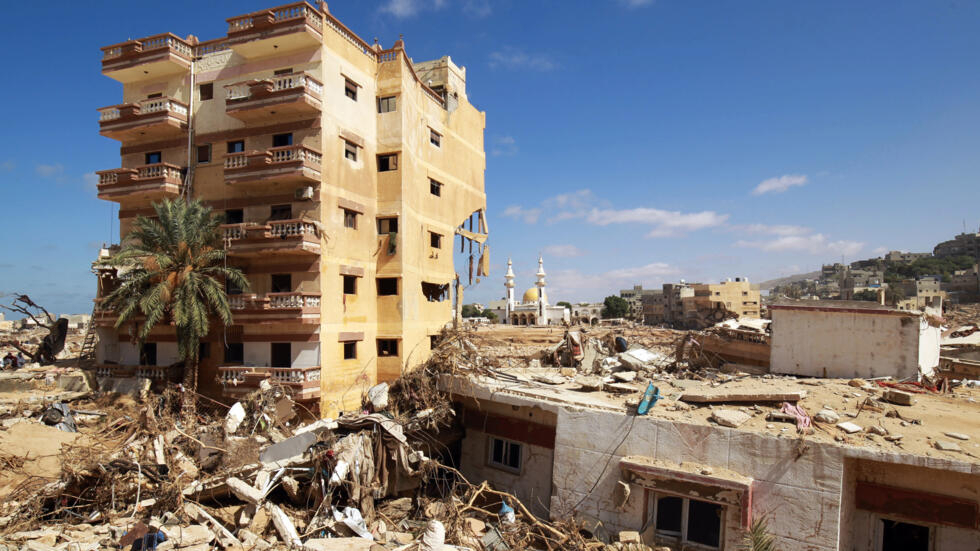In a heart-wrenching catastrophe that has left Eastern Libya reeling, the collapse of two dams has led to a devastating flood in the coastal city of Derna. As rescue teams tirelessly search for bodies amid the aftermath, the death toll has risen to a staggering 11,300 lives lost.
The tragedy unfolded due to heavy rains triggered by Mediterranean storm Daniel, which unleashed deadly flooding across the region last weekend. The torrents of water overwhelmed the two dams, resulting in a colossal wall of water surging several meters high through the heart of Derna. Entire neighborhoods were obliterated, and tragically, some residents were swept out to sea.
As the days pass, the agony deepens, with more than 10,000 individuals still unaccounted for, according to the Libyan Red Crescent. Search and rescue teams, six days into their relentless efforts, continue to brave the treacherous terrain, sifting through mud and the remnants of buildings, in their quest to recover both bodies and potential survivors. The Red Crescent’s grim confirmation of 11,300 deaths underscores the magnitude of this calamity.
Claire Nicolet, who leads the emergencies department of the Doctors Without Borders aid group, paints a grim picture of the ongoing search efforts. She revealed, “Rescuers found a lot of bodies” on a recent day, and their somber task persists. “It was a big number… the sea is still ejecting lots of dead bodies unfortunately,” she conveyed. In the face of such grimness, she emphasizes the dire need for massive aid endeavors, including urgent psychological support for those who have lost their loved ones. The burial of bodies, amid the widespread devastation, remains an immense challenge, notwithstanding some progress in coordinating search and rescue operations and distributing aid.
Amidst the grim recovery efforts, authorities and aid organizations are grappling with the looming threat of waterborne diseases and the potential movement of explosive ordnance left behind from Libya’s recent conflicts.
Libya’s General Prosecutor, Al-Sediq Al-Sour, has vowed to launch a thorough investigation into the collapse of the two dams, which date back to the 1970s. He also promises to scrutinize the allocation of maintenance funds, indicating that local authorities in Derna and previous governments will be subject to inquiry. Al-Sour affirmed, “I reassure citizens that whoever made mistakes or demonstrated negligence, prosecutors will certainly take firm measures, file a criminal case against him, and send him to trial.” However, the feasibility of conducting such an investigation in a nation plagued by a decade of turmoil and division remains uncertain.
Local officials in Derna had issued warnings to the public about the impending storm, and residents were instructed to evacuate coastal areas, fearing a surge from the sea. However, crucially, there was no forewarning about the dams’ potential failure, which occurred in the early hours of Monday while most residents were asleep in their homes.
Revelations from a state-run audit agency report in 2021 indicate that the two dams had not been adequately maintained, despite the allocation of over $2 million for this purpose in 2012 and 2013. A Turkish firm, Arsel Construction Company Limited, had been contracted in 2007 for maintenance work on the two dams and the construction of an additional dam in between. While the firm claims to have completed its work in November 2012, it has not responded to requests for further comment, leaving questions surrounding their involvement.
Amidst the despair and tragedy, local and international rescue teams continue their relentless work, tirelessly searching for bodies and potential survivors in Derna, a city once home to 90,000 people.
One survivor, Ayoub, shared his harrowing story of loss. His father and nephew perished in Derna on that fateful Monday, just a day after the family had fled flooding in the nearby town of Bayda. He recounted how his mother and sister had managed to reach the safety of the roof, but tragically, others in the family did not survive. Ayoub’s words captured the pain that permeates the region: “I found the kid in the water next to his grandfather… I am wandering around, and I still don’t believe what happened.”
Al-Sour, the General Prosecutor, has appealed to residents with missing relatives to report to a forensic committee dedicated to documenting and identifying the retrieved bodies. He emphasized the urgency of cooperation to expedite this grim process.
The flooded city of Derna remains inaccessible to the public, as authorities seek to facilitate search efforts by restricting access. The challenging task at hand involves digging through mud and collapsed structures in the hopes of recovering the thousands still unaccounted for. Many bodies are believed to be buried under rubble or lost at sea, adding to the complexity of this tragedy.
The devastating storm, which wreaked havoc not only in Derna but also in other parts of eastern Libya, including the towns of Bayda, Susa, Marj, and Shahatt, has left tens of thousands displaced in the region. Schools and government buildings have become makeshift shelters for those in need.
Among the casualties are dozens of foreigners, including individuals who had sought refuge from war and turmoil in neighboring regions. Others had arrived in Libya for work or were en route, hoping to embark on a perilous journey to Europe. The tragedy extends its reach across borders, with at least 74 men from an Egyptian village and numerous Syrians who had traveled to Libya perishing in the flood.
As the recovery efforts continue and investigations unfold, Eastern Libya stands as a grim reminder of the consequences of neglecting vital infrastructure, particularly in a region vulnerable to the increasing frequency and severity of extreme weather events driven by climate change. The tragedy also underscores the resilience and unity of communities in the face of unimaginable loss and suffering, as they come together to support one another and navigate the arduous path to recovery.


